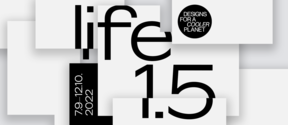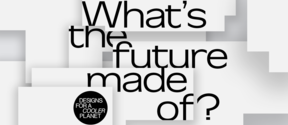Life 1.5 – an exhibition of planet-friendly materials, fashion and food
Designs for a Cooler Planet is a five-week-long festival celebrating experiments in planet-friendly materials, fashion, and food.

Imagine a life where everything we use is recycled, upcycled and wisely produced. Imagine a life where global warming doesn't exceed 1.5 degrees. Imagine a better life – for you, for future generations and for the planet.
It will take bold, systemic changes to make that world real. Aalto researchers, designers and entrepreneurs are working to discover, develop and create alternatives to put us on that path. We invite you to Otaniemi to experience and explore what Life 1.5 could be. It’s a five-week long festival open to everyone, celebrating experiments in planet-friendly materials, fashion and food.
This year, our exhibitions and events will be grouped into three sub-themes:
Here’s a sneak peek of what you'll see in September:

There's a lot of demand for sustainable, commercially viable recycled or alternative textile fibres. Several innovations in Finland have birthed spin-off companies, such as Ioncell fibre, Spinnova and Infinited Fibre Company. A new member of this ecosystem is Norratex, a fibre manufactured without any toxic chemicals or expensive solvents.
Norratex will showcase a plant-based textile fibre made from water hyacinth. The Norratex fibre process also generates a sugar sidestream which can be fed to microbes to produce a colourful biological dye.
Water hyacinths are invasive, forming mats that cause flooding and decrease dissolved oxygen concentration, harming tropical fish populations in Asia. Norratex offers a way to turn these harmful plants into high value textiles and textile dyes, reducing the need of virgin raw-material and fossil-based pigments.

Nature consumes only what it provides, producing no waste. Finland is a world leader in bio-based products and technologies, and ChemArts' exhibition titled Second Nature will once again showcase the fascinating biomaterial experiments that might be the seeds of new solutions.
This year, one of Second Nature's most fascinating exhibits is designer Megan McGlynn's Intension - Sample Wall, which comprises hundreds of different geometric tests made with nanocellulose. The curled, organic shapes are reminiscent of animals, plants and bacteria cataloged as scientific samples.

Do you want to take a look at the the future of sustainable fashion? One of our main exhibitions this year is called Wardrobe of the Future, a curated collection of state of the art textiles, clothing and fashion innovations.
In addition to a few pieces from Aalto’s famous Näytös, there's also the Shimmering Wood sneaker and Irene Puraschit’s Flower Matter, which was nominated for the New European Bauhaus Prize shortlist in 2022, and plenty more to see!

The global agricultural sector faces numerous challenges, such as a shortage of arable land and water, and is also involved in many aspects of the climate crisis. Vertical farming is an alternative approach that enables steady food production in all environments and climates, as well as bringing production closer to the consumers.
Top researchers from different scientific fields and the team behind the wood-based greenhouse, will discuss the rapidly growing industry of vertical farming in an open seminar on October 5 at 13:00-15:00.

Today, most textile products are filled with unsustainable materials, such as down feathers or fossil-based polyester fibres. Four Aalto students established a company that provides climate-positive textile products and fillings for fashion apparell and home textiles.
Industrial use of the down feather resembling seed of the cattail plant could reduce agricultural emissions, regenerate peatland ecosystems, offer climate-friendly income sources for landowners and replace unsustainable fillings in textile products.

Designs for a Cooler Planet is a five-week-long festival celebrating experiments in planet-friendly materials, fashion, and food.

Planet-friendly alternatives for materials, mindsets and architecture.

Slow and more sustainable textiles, clothing and fashion systems.

Better alternatives for food, food systems and packaging.
The festival includes a science & design exhibition that consists of over 20 projects. You can also join the tours and open seminars.
Designs for a Cooler Planet is part of Helsinki Design Week’s official festival programme and aWorld Circular Economy Forum 2022 (WCEF) side event.
Everyone is welcome to visit the Designs for a Cooler Planet event September 7 – October 12, 2022 in Otaniemi, Espoo. The complete programme will be published in August.
Helsinki Design Week is the largest design festival in the Nordic countries. Aalto University is one of Helsinki Design Week’s main partners.
Aalto University’s biggest annual exhibition showcases interdisciplinary experiments from our researchers and students. Designs for a Cooler Planet will be held next in the autumn of 2026.



